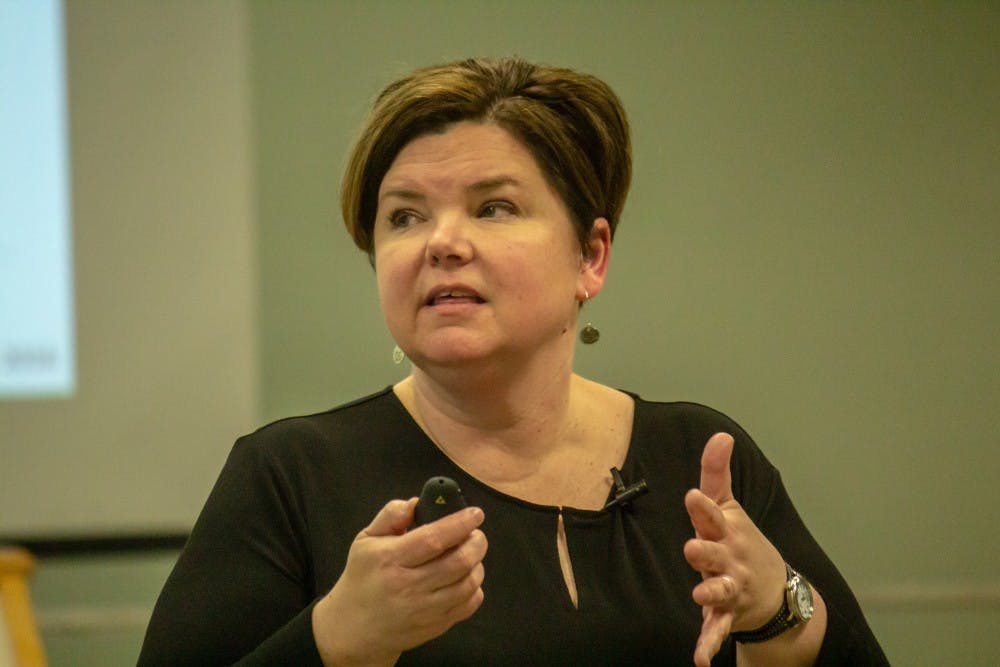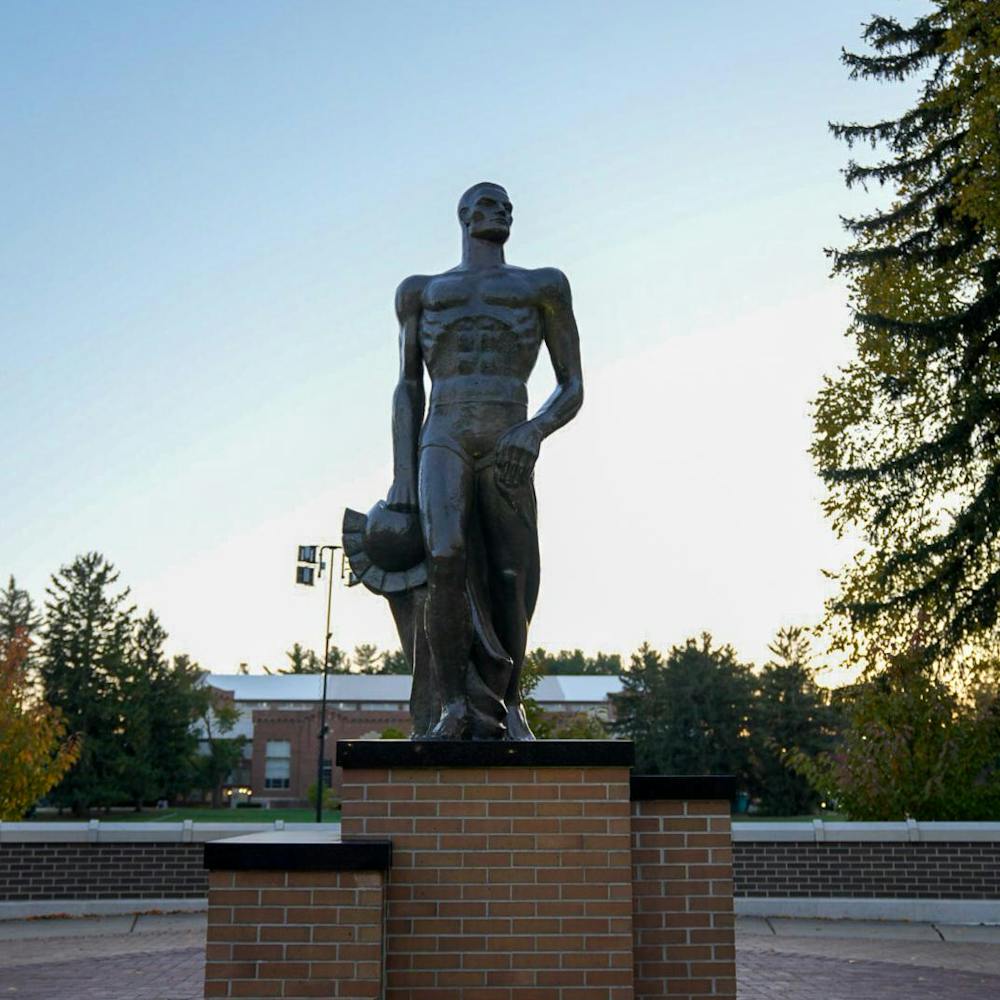Dr. Rebecca Campbell, a professor in MSU’s Ecological-Community Psychology Department, gave a talk concerning the science behind the trauma of sexual assault and how best to help survivors Monday night at the Wonders Kiva.
The talk described how the brain processes trauma and, afterward, a Q&A session was held where survivors and other community members asked for a psychological perspective on how to move forward after trauma occurs.
“All of us thought that we’d had a lot of conversations during this post-Nassar time at MSU about sexual assault in the classroom, it seems like a very overarching theme this year and last,” senior Alexis Sargent of the James Madison College (JMC) Student Senate, said.
The JMC Senate sponsored the event, along with the Undergraduate Social Policy and Affairs Association and the Spartan Support Network.
“Oftentimes we’re not having really substantive conversations about how to help survivors and support them. We thought this conversation was really necessary in providing that to the MSU community,” Sargent said.
During the discussion, Campbell said during a traumatic event like sexual assault, the brain only concerns itself with staying alive. The prefrontal cortex, which controls logical decision-making, shuts down and an autonomic “fight, flight or freeze” response occurs. This “freeze” is known as tonic immobility, a situation in which the body is unable to move, the mouth is unable to talk, but the mind is aware of the situation.
Campbell said this is why victims of sexual assault don’t always act the way that society thinks that they “should have” acted.
“The freeze that some people experience; I’d never even heard of that, and this idea that the larger narrative is ‘what were you wearing? Why didn’t you fight back?’” Sargent said. “So much of what she said is that they couldn’t fight back. They didn’t have a choice. They didn’t have the ability to. That was really eye-opening.”
Ellie Scandirito, a 35-year-old resident of Detroit, said she recently reported her experience from 19 years ago. The assault occurred at the hands of an off-duty Grosse Pointe police officer, and Scandirito has become an activist in leading a change in Michigan law to help support survivors.
She attended the meeting in Wonders and spoke afterward about the impact of Campbell’s words.
“I’ve been watching her YouTube videos, and I’ve heard about her. It’s nice to see folks here who are probably a good fifteen years younger than me,” Scandirito said. “It gives me hope that the younger generation is really taking this head on and having these conversations. Because when I was in my early twenties, we weren’t talking about this. It’s great that this is happening.”
Scandirito said the survivors of ex-MSU gymnastics doctor Larry Nassar's sexual abuse helped her gain empowerment, particularly Rachael Denhollander, the first survivor to publicly accuse Nassar. She said they have given her inspiration to speak of her own experiences.
“I’m making a lot of connections even years later. My own connections but also in thinking about helping other people,” Scandirito said. “Since I’ve come forward in the last twelve months, a lot of people are now looking to me for help. They’re disclosing their assaults that have happened to them many years ago, starting to want to talk about it. I want to be a better support person for other people.”
Campbell spoke of the dysregulation of the feedback loop in the body between the hypothalamus in the brain, the pituitary glands at the base of the brain and the adrenal glands located at the top of each kidney, which occurs during a traumatic event like sexual assault.
“It’s a brain-body loop that is activated in any major trauma that affects how the body responds behaviorally, how the mind remembers and what some long-term health effects might be of trauma,” she said.
Campbell said this dysregulation can result in short-term effects like shock, numbness, depression, self-blame and isolation, and can cause longer-term Post-Traumatic Stress Disorder (PTSD) and clinical depression. She said scans of the brain between soldiers who have been in combat and survivors of sexual assault are nearly indistinguishable.
Senior Alex Hudson is a member of the peer outreach education program at MSU, which runs the freshman seminars on sexual assault. She said she was particularly impressed with the number of older, post-college people who attended the event.
“I definitely appreciate it, because I know that a lot of people over 40 aren’t open to learning new things, especially things that are starting to be epidemic now, they see it in a different light,” Hudson said. “So I definitely appreciate the willingness to learn and be open-minded about this new information.”
During the second part of the talk, Campbell discussed how the community can help survivors if they choose to disclose their assault.
“Stop talking is what I say to people. Say less, stop talking about yourself. Stop trying to tell people what to do,” she said. “Do more listening, ask them what they need, ask them how they can be helpful. Say I believe you. I’m here to help. I can help you track down information you need, that type of thing.”
Support student media!
Please consider donating to The State News and help fund the future of journalism.
Campbell said most people have a tendency to interrogate survivors.
“They ask a lot of questions because they’re curious, because they want to help, because they don’t believe, because they want to play amateur cop, because if they get some information and it doesn’t add up they want to ask more," she said. "But again, the best way to support survivors is not to be pressing them for a lot of details, and get them to confidential sources.”
Sargent said her biggest takeaway from the talk was to not try to ask for details from survivors when they come forward with their stories.
“I remember myself doing that, and when she said you’re not a police officer, and I’m like yeah, why did I do that?" she said. "My curiosity should not trump someone else’s trauma, and it’s important to remember that.”
Discussion
Share and discuss “Understanding the Trauma of Sexual Assault discussion held at Wonders Hall” on social media.








